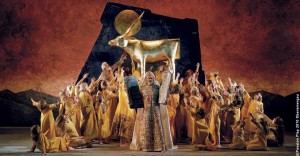Happy are those who hear the joyful call to worship. (Psalm 89:15)
 Do you remember the old Anne Murray song from 1983, A Little Good News? She lists off a litany of woes: fighting in the Middle East, bad economy, hostages, hijacked plane—and more. Hard to believe it was written over 30 years ago. She then moves into some wishful thinking, how things could change if we just… well like I said, wishful thinking. That’s why it is worth reading that verse again: Happy are those who hear the joyful call to worship.
Do you remember the old Anne Murray song from 1983, A Little Good News? She lists off a litany of woes: fighting in the Middle East, bad economy, hostages, hijacked plane—and more. Hard to believe it was written over 30 years ago. She then moves into some wishful thinking, how things could change if we just… well like I said, wishful thinking. That’s why it is worth reading that verse again: Happy are those who hear the joyful call to worship.
The word happy is usually translated as blessed. But happy is good, because blessed wreaks of ancient rituals and religious artifacts. And when you look at most people in the Church, for those looking from the outside, they don’t see a lot of happiness, and they may wonder if blessedness looks like something you need to endure.
Now the word joyful sound can be translated as that, or as a battle cry. But I’m going to go with a call to worship, which would be the sound of joy, not the sound of war.
So who is sounding this joyful call to worship? Could it be joyous worshipers who are calling us to join in? That could very well be, since the remainder of the verse says: “For they will walk in the light of your presence, LORD.” It’s kinda tough not to be joyful, when you’re walking in the presence of the LORD. And it should be difficult to ignore when there is light all round you—especially when we live in such a dark world.
But the first call to worship is from the LORD Himself.
But now, thus says the Lord, your Creator, O Jacob, and He who formed you, O Israel, “Do not fear, for I have redeemed you; I have called you by name; you are Mine! (Isaiah 43:1)
He called you to salvation when we told you the Good News; now you can share in the glory of our Lord Jesus Christ. (2 Thessalonians 2:14)
If your worship has turned into ashes, remember He has called you to Himself, to walk in His light, and to share in the glory of His One and Only Son, Jesus Christ. With all that, how can you be anything else but happy. And for those who are looking in, may they see your joy!


 This verse appears three times, twice in this one and once is Psalm 43. When you read these Psalms together, you realize that this phrase (v. 5, 11, and v. 5 in the second psalm) fills the function of a refrain or chorus. Now the purpose of a chorus (except for those who aren’t very good with lyrics and need to say things over and over) is to repeat lines both thematically and musically to ensure it sticks, and that we don’t miss whatever it is being said (sung). So what precedes this chorus?
This verse appears three times, twice in this one and once is Psalm 43. When you read these Psalms together, you realize that this phrase (v. 5, 11, and v. 5 in the second psalm) fills the function of a refrain or chorus. Now the purpose of a chorus (except for those who aren’t very good with lyrics and need to say things over and over) is to repeat lines both thematically and musically to ensure it sticks, and that we don’t miss whatever it is being said (sung). So what precedes this chorus? That is why the Lord’s anger burned against his people, and he abhorred his own special possession. He handed them over to pagan nations, and they were ruled by those who hated them. Their enemies crushed them and brought them under their cruel power. Again and again he rescued them, but they chose to rebel against him, and they were finally destroyed by their sin. Even so, he pitied them in their distress and listened to their cries. (Psalm 106:40-44)
That is why the Lord’s anger burned against his people, and he abhorred his own special possession. He handed them over to pagan nations, and they were ruled by those who hated them. Their enemies crushed them and brought them under their cruel power. Again and again he rescued them, but they chose to rebel against him, and they were finally destroyed by their sin. Even so, he pitied them in their distress and listened to their cries. (Psalm 106:40-44) You can see a drastic, neck-wrenching conversion between these two verses. And it’s a conversion in the wrong direction. Before these passages, the Psalmist was recounting the beginning of the Exodus, how the people rebelled, even from the start.
You can see a drastic, neck-wrenching conversion between these two verses. And it’s a conversion in the wrong direction. Before these passages, the Psalmist was recounting the beginning of the Exodus, how the people rebelled, even from the start. LORD is from everlasting to everlasting on those who fear Him, and His righteousness to children’s children, to those who keep His covenant and remember His precepts to do them. God gives a new and eternal nature when we love and obey Him.
LORD is from everlasting to everlasting on those who fear Him, and His righteousness to children’s children, to those who keep His covenant and remember His precepts to do them. God gives a new and eternal nature when we love and obey Him. Praise the Lord! Give thanks to the Lord, for He is good! His faithful love endures forever. Who can list the glorious miracles of the Lord? Who can ever praise Him enough? (Ps 106:1-2)
Praise the Lord! Give thanks to the Lord, for He is good! His faithful love endures forever. Who can list the glorious miracles of the Lord? Who can ever praise Him enough? (Ps 106:1-2) This psalm begins on a grandiose scale: Sing a new song to the Lord! Let the whole earth sing to the Lord! Nothing less than “the whole earth” is to sing to the LORD. The verses continue to crescendo until, in these final few verses, all of creation joins in the song. The heavens are glad; the earth rejoices; the sea and all its creatures shout His praise; the fields and crops burst with joy; and the trees sing.
This psalm begins on a grandiose scale: Sing a new song to the Lord! Let the whole earth sing to the Lord! Nothing less than “the whole earth” is to sing to the LORD. The verses continue to crescendo until, in these final few verses, all of creation joins in the song. The heavens are glad; the earth rejoices; the sea and all its creatures shout His praise; the fields and crops burst with joy; and the trees sing. This Psalm was written by Asaph, who was a Levite in the service of King David. He was also a drummer, and spent a lot of time serving before the ark of the LORD.
This Psalm was written by Asaph, who was a Levite in the service of King David. He was also a drummer, and spent a lot of time serving before the ark of the LORD. Strangers. Aliens. Foreigners. A political platform.
Strangers. Aliens. Foreigners. A political platform. So we’re driving on our way home after spending the afternoon walking around a modern art gallery, and now we’re talking about buildings. And my daughter says to me that buildings that have no windows have something to hide. (We happened to have been driving by a “business establishment” notorious for that sort of thing.) Then I responded that there are some churches in town that don’t have windows. And she says, “Hmm.” Now I know a couple of churches that fit that description, no windows, because they do lots of productions—you know, “Lights , cameras, action!”
So we’re driving on our way home after spending the afternoon walking around a modern art gallery, and now we’re talking about buildings. And my daughter says to me that buildings that have no windows have something to hide. (We happened to have been driving by a “business establishment” notorious for that sort of thing.) Then I responded that there are some churches in town that don’t have windows. And she says, “Hmm.” Now I know a couple of churches that fit that description, no windows, because they do lots of productions—you know, “Lights , cameras, action!” going on the inside. The other thing windows do is let in light, reminding us how important light is to us. And one more thing, they keep us from getting absorbed in our little (or big) box, because we can see what’s going on around us: people passing by who need Jesus; or seeing the trees, or the river, or the mountains clap for joy.
going on the inside. The other thing windows do is let in light, reminding us how important light is to us. And one more thing, they keep us from getting absorbed in our little (or big) box, because we can see what’s going on around us: people passing by who need Jesus; or seeing the trees, or the river, or the mountains clap for joy.